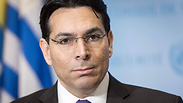
I now realize Israel is not the center of the world, says UN envoy
A year after being exiled to New York by Prime Minister Netanyahu, Danny Danon feels he has proved himself to all those people who called his appointment a catastrophe waiting to happen. ‘As far as I’m concerned, the results speak for themselves,’ he says, taking pride in small victories. ‘We did things that have never been done before by Israelis at the UN.’
“The difference between the public and non-public UN is almost inconceivable,” he says, smiling. “I was prepared for it, but the penny doesn’t drop until you sit with an ambassador from an Arab state for breakfast and you discuss everything - their wife and the kids and life in New York - and then half an hour later you get into the elevator at the UN with him and he doesn’t know you. You become air. I don’t know if I’m his mistress or if he is my mistress, but it feels strange. I haven’t gotten used to it yet.”
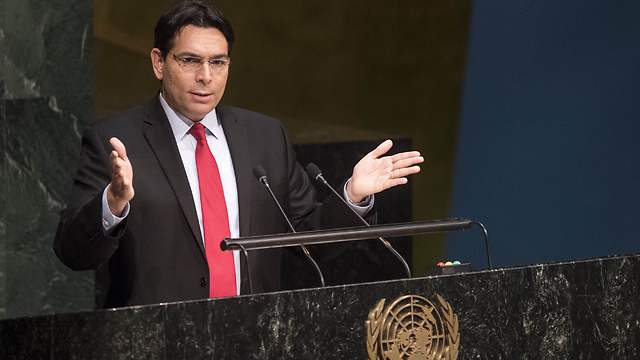
During the secret breakfast, do you discuss the fact that you will soon get into the elevator and he will ignore you?
“Of course. He says to me, ‘Do you know what would happen if someone were to take a picture of us together here and the picture were to be published in my country? Nothing would happen to you, but I would have nowhere to go back to.’ Several hours later, he can stand at the Security Council and say horrible things, but then I already know in advance what he is about to say and how serious he really is."
“People sometimes ask, ‘What’s the point of all these talks below the surface if in the end they speak against us and vote against us?' I explain that the important thing is that I know where he is coming from and what motivates him, I understand the balance of power, and the balance sometimes changes and the world doesn’t even notice. He can say to me, ‘This country is the biggest problem in the Arab League right now. They are leading this and this move.’ Or, ‘I am about to say this and this, but we won’t kill ourselves to achieve it.’ I draw information. It doesn’t change his vote that day, but it may help us change his vote in the future.”
And what does he get out of such a dangerous meeting?
“He also hears things that he doesn’t know and it helps him. Information is the most important weapon today.”
But you can’t meet him in public.
“No. You saw that even Palestinian President Mahmoud Abbas couldn’t attend late President Shimon funeral without being blasted. One of the Arab ambassadors told me about an event he is organizing for kids, and we have children the same age, but I can’t attend. Even just going to the park to ride bikes is problematic as far as he’s concerned. There are ambassadors I can do fun stuff with, and there are ambassadors I have to meet secretly. Both in the public world and in the world below the surface, we have done important things this year, unprecedented even. I have learned a lot. I am tired but satisfied.”
Against all pessimists
Danny Danon concludes his first year as Israel’s ambassador to the UN in October. His appointment raised quite a few eyebrows and was the subject of many jokes, but it was also received with the collective acknowledgement that Danon’s status had become so strong that Prime Minister Benjamin Netanyahu decided it would be best to exile him. Granted, it is the most desired exile, but it is still an exile. Far from the Likud’s Central Committee, far from the Knesset cafeteria, far from the possibility to position himself as the next big thing.
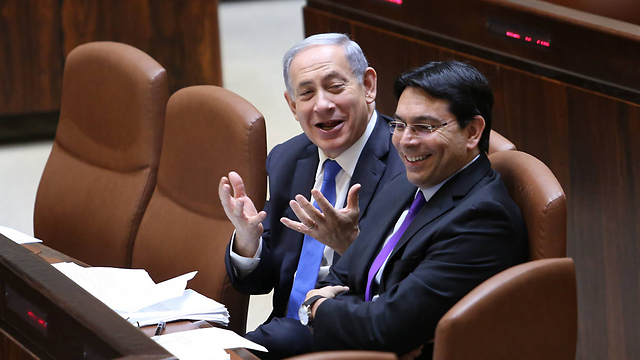
Danon knew that most people expected him to fail, and that quite a few hoped he would fail. The consensus among commentators, both in Israel and in the United States, was that his appointment was a catastrophe waiting to happen. Danon, they said at the time, is not just a radical person - a settlement supporter who opposes the two-state solution - but he also has a big and uncontrollable mouth, not to mention his Hebrew accent, and all sorts of rumours which reek of nothing but racism.
A year later, Danon is sitting in his office at the Israeli Consulate in New York, a 10-minute walk from the UN building, and tries very hard not to say, “I proved myself to everyone.” He can’t say it, he is a politician who knows that everything canchange tomorrow morning, but the facts are that he has proved himself. Perhaps not to everyone, perhaps not even to most people, but to a sufficient number of people.
Jewish Week, a popular and highly regarded newspaper among the Jewish community elites in New York, which set off warning bells upon Danon’s arrival, published an editorial last week, stating: “We should note that we, along with many other skeptics, voiced our concerns at Danon’s appointment earlier this year. We felt his leadership role in the settlement movement and outspoken criticism of the two-state solution to the Palestinian problem, when Jerusalem was on record as supporting such a solution, made him a problematic diplomat. But he has taken to the task with energy, creativity and an open approach.”
“As far as I’m concerned, the results speak for themselves,” Danon pulls out a cliché. “We made breakthroughs and did things that have never been done before by Israelis at the UN. When I was appointed, there was a whole debate about whether the fact that I’m a politician is a good or bad thing, but the UN is a political body and I know how to play this game.”
You know how to play it in Israel. This is the big world.
“Politics is politics. I came here with the perception that we all have in Israel, that the entire world is against us and that I am coming to joust with windmills, but I learned that you can sometimes win here and that gives me a lot of satisfaction. They still seem like small victories, but we feel the waves they create. It’s not that the UN has changed. It is still anti-Semitic and obsessively against Israel, and next year there will be another deluge of resolutions against us, but now I can say to my team: ‘Here, instead of crying all the time we can fight and win.”
For example?
“For example, my election as chairman of the Legal Committee, one of the six UN committees. This is a huge victory. It’s the first time since Israel joined the UN that its ambassador chairs a permanent committee.”
Unbelievable.
“I believed in it. I saw an opening to compete for the committee’s chairmanship and we did a lot of hard and quiet work. This is where the advantage of a politician, who knows the game, comes in. People said to me, ‘You know what will happen at the UN if Israel’s ambassador is elected to such a position?’ But we didn’t give up and there was obviously a strong countercampaign. Iran, for example, sent a letter to the Non-Aligned Movement, saying Israel cannot chair the committee. We are talking about a movement of 100 states, and there is a regulation that says that if no state responds until a certain time, the letter goes on to represent the entire group. In other words, it basically kills my nomination.
“I began approaching people, and I am not talking about my friends, these are not Europeans. Here you are asking someone to issue a letter to 100 non-aligned states and say, ‘I support Israel.’ That is one hell of a cash payment. In the end Singapore jumped in and when India joined and issued a letter opposing the Iranians, it destroyed them. It’s also the result of the real budding relationship between us and India, and of my extremely good personal relations with the Indian ambassador here.”
And then when you were elected?
“Huge satisfaction. We sat for three hours and waited for the results in crazy suspense. At the Knesset you don’t have to wait, there is always someone who sends a text message and we know the result before it is announced. Here you don’t hear a thing. In the end, 109 states voted for me in a secret vote. It was a very exciting moment. I called my wife and she immediately brought the kids."
“In my first address here at the plenum, I didn’t really know where I was. Today, I enter a room of 193 states and I chair the discussion. I am the one who lets the Iranian representative speak, who manages conflicts which are unrelated to Israel. We shattered a real glass ceiling. After all the hard work and all the slander against me, I gave myself one moment of real joy, but it mainly showed people that there are ways to win here.”
Another accomplishment Danon is proud of is the anti-BDS conference he managed to organize at the UN General Assembly. The Jewish community in the US is at odds over the way to deal with the boycott against Israel, which in America is only felt in campuses and hardly anywhere else.
“There is institutionalized anti-Semitism in the UN,” Danon says. “When I arrived, I was told not to make a big deal out of BDS, that they should not be reinforced, but the moment they passed a decision to create a UN black list which would include anyone who does business with Judea and Samaria, it’s no longer just some campus problem."
“We decided to organize an event against BDS here inside the building. They told us, ‘Okay, in May 2017.’ I said, ‘We’ll have one in May 2017 and one now.’ We used contacts, found precedents and all kinds of rules of procedure, and received the General Assembly hall. We brought 2,000 people, and students came out of there with the power to return to the campuses and fight. We suddenly realized that the UN platform can be used in Israel’s favor as well.”
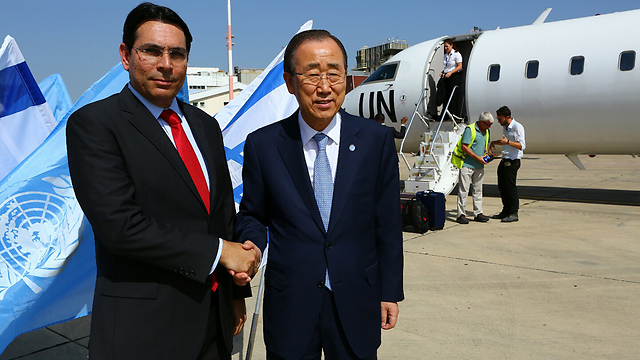
Have you personally felt anti-Semitism?
“Yes, there was an incident in which the Venezuelan ambassador, Rafael Ramirez, said during a Security Council meeting that Israel was preparing the final solution for the Palestinians. A final solution, no less. I wasn’t present at the meeting, and other Council members protested and demanded that he apologize. He called me at night and said, ‘Hello, I don’t speak to Israelis, but I would like to apologize for what was said at the Security Council.’ I said to him, ‘I appreciate the fact that you called, but you should apologize on the exact same stage where you made these comments.’ A day or two later he really did apologize in public, but we don’t talk, not even a hello. Venezuela is one of our biggest enemies here.”
What about friendly countries that vote against us?
“Some European countries sometimes automatically join delusional resolutions. I say to a European ambassador, ‘Read the text. How can you vote for this?’ And he mutters something. Many times, it’s just automatic. There are people who wake up in the morning and their job is to delegitimize Israel. But I am a great believer in personal relations. Sometimes it’s easy to forget that every ambassador here has one vote. The representative of some remote island is like (US Ambassador to the UN) Samantha Power.”
How do you develop relations with people who you say are automatically against Israel?
“You show them a different Israel. In the summer, I brought 11 ambassadors to Israel. We were together all the time. On the first evening, we went out to eat at the Tel Aviv Port and saw planes landing at Sde Dov Airport. One ambassador asked, ‘Are the planes here to protect us?’ I had to explain that those were regular civilian aircraft. Four days later, she already understood everything about Tel Aviv and about Jerusalem. The two most important things I have realized here are that there is no alternative to a personal relationship, and that because we are at a structured disadvantage, we have to think outside the box.”
One of the out-of-the-box cases took place on Independence Day, when instead of the usual reception it was decided to take the guests from the UN to Broadway. “There are many events here that you go to because you have too, but between you and me, most of them are not really interesting. So on our Independence Day we decided to do something completely different, because we wanted people to remember it. We booked am auditorium no Broadway and invited the ambassadors to watch ‘Fiddler on the Roof.’ There were 1,000 people there, and they remember it to this very day. I just attended a certain country’s reception, and the ambassador’s wife said to me: ‘That play was the best event I had been to.’ It has a huge influence, especially as it shows them different sides of Israel and Judaism.”
That’s all very nice, but there won’t be any substantial change in the UN’s attitude towards Israel until a solution is found for the conflict with the Palestinians.
“I’m not sure about that.”
Based on what? The prime minister said in his speech here that the UN would be in favor of Israel in a decade. That sounds pretty delusional.
"It’s not delusional if you see the changes taking place below the surface. We have advantages in many areas, and developing countries are beginning to discover them. When we bring ambassadors to Israel, what interests them the most at the end of the day is how we grow mango and how we invented the water desalination facility. These countries want water and food, and that serves as a gate as far as we’re concerned. There is a reason why we held a major event here with countries from Africa which wanted nothing to do with us for many years.”
What has changed?
“African countries joined the Arab boycott after the Yom Kippur War, but now they see us getting closer to the moderate Arab countries and feel the noose loosening. So when the prime minister arrived at the UN, we organized an open meeting and photo opportunity with 17 African leaders. That cannot be taken for granted. Each of those countries had to offer explanations to Arab countries."
That isn’t convincing enough. There is a key problem, and without solving it there won’t be a real change in the UN’s attitude towards us.
“I explain to everyone here that our willingness to negotiate is real. Every time someone asks me, ‘Why don’t you meet with Mahmoud Abbas?’ I reply, ‘Organize a meeting and we’ll be there.’ But Abbas prefers to have a UN resolution without meeting us, to score an achievement for himself without paying a price and without explaining to his public. There were talks about a meeting in Moscow, in Cairo, in France, in New York, but his strategy is to go to the UN, and I think people here are beginning to understand that.”
So you’re not afraid of a move that will happen after the US elections?
“I am paid to be concerned. I wake up in the morning and immediately check what is being prepared for us. There are voices around us, absolutely. I sat with the foreign minister of a Western state who said, ‘Clearly, nothing will happen until the elections because the Americans won’t go with us, but after the elections we’ll try to lead a move.’ It could be a condemnation of the construction in Judea and Samaria or setting parameters – in other words, determining the results of the negotiations for us, which won’t work of course. From my conversations with the Americans, there are no such plans at the moment, but there is a discourse.”
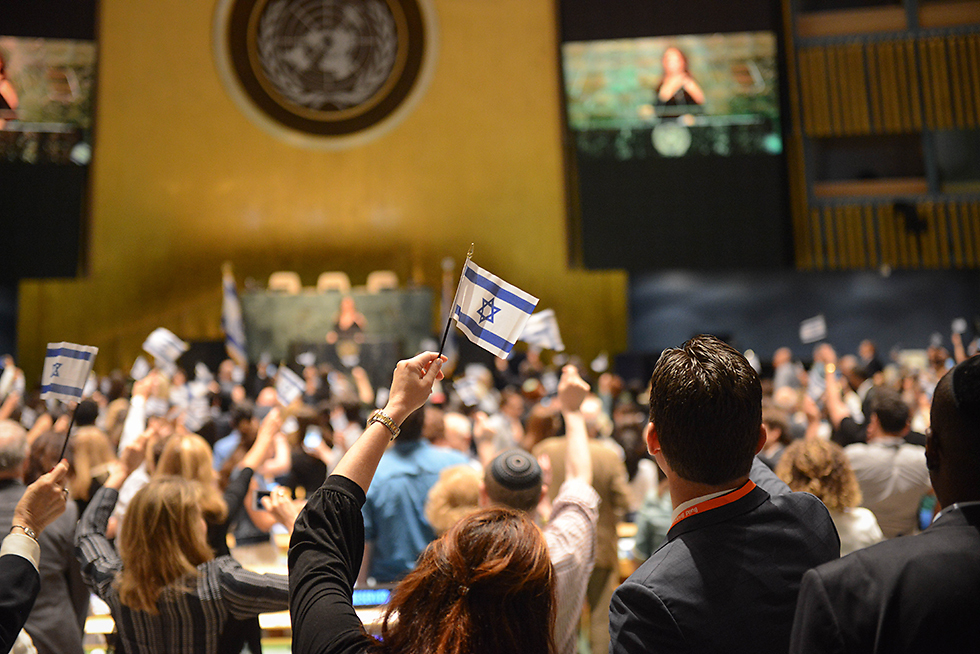
There have been many ups and downs with the outgoing secretary-general, Ban Ki-moon.
“That’s true. There was a very big crisis when he expressed an understanding towards terror. People said we should not confront him, but when you have to – you have to. We settled it afterwards. I took him to Israel on a visit which did not deal with crises and conflicts. We are not happy with everything he did, but deep inside he knows the facts and understands what it means to be the only democratic state in such a region.”
What are your expectations from the next secretary-general, Portugal's former Prime Minister Antonio Guterres?
“The important thing is that he will make decisions based on principles of good and bad, rather than based on political constraints. It will automatically lead to a fair treatment of Israel. Guterres has been in the global diplomatic arena for many years now, and as far as Israel is concerned it’s a new era and a new leaf vis-à-vis the UN secretary-general.”
How are your relations with the Americans?
“Excellent. With all the rows we’ve had, the cooperation with the delegation at the UN has always been good.”
Where do you stand in regards to the presidential race?
“Oh no, I’m not going to say anything. Our situation will be good, no matter who is elected. We know the people and the candidates, but there is certainly something happening in the American discourse. I have friends from both parties, and I make sure to be very careful.”
‘I came out of the bubble’
Danon, 45, was born in Ramat Gan shortly after his father, Yosef, was critically wounded in the War of Attrition. It was a miracle he stayed alive, and little Danny only knew him in that state. That may also be the reason why he was the only one who knew how to communicate with him. He read a lot of history books, and shortly after his bar mitzvah he already knew where he was located on the political map. In the decades that have passed since then, his opinions have barely changed, but the past year at the UN did put a lot of things into perspective.
“I came out of the bubble,” he says. “I realized that there are other issues in the world, that we are not really the only country. You see the US versus Russia, you see Britain and Mauritius fighting over some remote island and it’s a huge story, and you realize that we are not the center of the world. My value system has not changed, but I have a greater understanding of the international arena. In Israel you think the entire world is against us, and here you realize it’s not really black and white.”
Do you also understand that you can’t say whatever you want?
“It took me some time, I’ll admit. I knew this wasn’t the Knesset, but I didn’t know that you actually stick to every word in the text here. Even in the ceremony we held in memory of Shimon Peres, which I wanted to come to and speak from my heart, I ended up sitting at night, writing my comments and reading them word for word, just like the UN secretary-general and Samantha Power did. That’s the way it is here, every word is calculated in advance.”
Sounds like horrible torture for Danny Danon.
“At first it was difficult. I think you’re more interesting without a text. Even in closed Security Council discussions, people read from paper. There was only one time when I couldn’t restrain myself. We were in the middle of a discussion during a wave of terror attacks, a dispute broke out with the Palestinian representative, and there was a terror attack as we were arguing. I demanded that he condemn the attack and he didn’t want to. I said to him, ‘Condemn terror in general. Here, I condemn terror everywhere,’ and he refused. I actually shouted at him, ‘You should be ashamed of yourself.’ People told me they had never seen such a stormy discussion.”
Last month, Danon walked through the UN corridors with Prime Minister Netanyahu, and they both did and said what they had to, but neither them has forgotten the time when Danon was fired from the position of deputy defense minister after defining Operation Protective Edge as “a failure because of the prime minister’s weakness.” Danon became very popular in the Right at the time, probably too popular, and despite a ceasefire which included a short-term appointment as minister of science, technology and space, Netanyahu decided to give him a promotion which came from very little love. If Danon was offended in any way by the decision to send him here, it doesn’t show. Things worked out pretty well for him.
Many seats have been vacated in the year you were not in Israel. Any regrets?
“No. I remember that when I decided to accept the appointment, good friends said to me: ‘What are you doing? You are a government minister, you don’t move from the table, you have to advance on the table, you don’t move off of it.’ They asked me, ‘What’s the strategy?’ And the truth is I don’t have one."
“Clearly, after I complete my term here, I will return to Israel and be very active, and I think the experience I am gaining here will help me there. I see ambassadors around me, and I know that when they complete their terms they will return to their countries and become very serious players. I am at peace with the decision to come here, but there are still friends who say to me: ‘If you were here now, you could have been X or Y.”
Are you involved in what is happening in politics in Israel?
“Twenty-three years ago I was on a mission in Florida and would occasionally send a fax with updates about my activity, and that’s how I felt involved. Today it’s Twitter and Facebook. I follow and I know what is happening, but I am not there on a daily basis and I don’t have influence, although I miss the Knesset.”
Kosher cafeteria at the UN?
Danon’s next mission is to introduce a kosher cafeteria at the UN. It may not be the Partition Plan, but Danon is clearly a great admirer of small victories.
“I was laughed at the first time I wore a skullcap at the Security Council. I ended a speech with a Bible verse from Psalms, so I put on a kippah,” he smiles. “We lit Hanukkah candles here, held a Passover Seder at the UN. Forty ambassadors arrived, sat down and read the Haggadah for three hours. I couldn’t believe it. This year, on Yom Kippur, there were no UN meetings for the first time. Last year, when the UN General Assembly was held during the holidays, US President Barack Obama addressed the GA on Yom Kippur and we were absent. I had to explain to Samantha Power why we didn’t come, and it was unpleasant. Now it won’t happen anymore.”
Did it pass a vote?
“No, it would have never passed a vote. We passed it through UN mechanisms. There are many ways, you just have to find them. Now we will try to organize a kosher cafeteria here.”
That will definitely not pass a vote.
“Obviously. We are not trying, but there is a halal cafeteria, so why shouldn’t there be a kosher one? I don’t want to put kosher supervisors here, but a corner with a few kosher sandwiches makes sense. It’s all through the mechanism, give and take, employee committees, politics. These are clearly small achievements, but they add up to a feeling that something real is happening. I know our enemies are frustrated by the fact that the UN used to be their home court, and now it’s not anymore. We are scoring too many goals.”
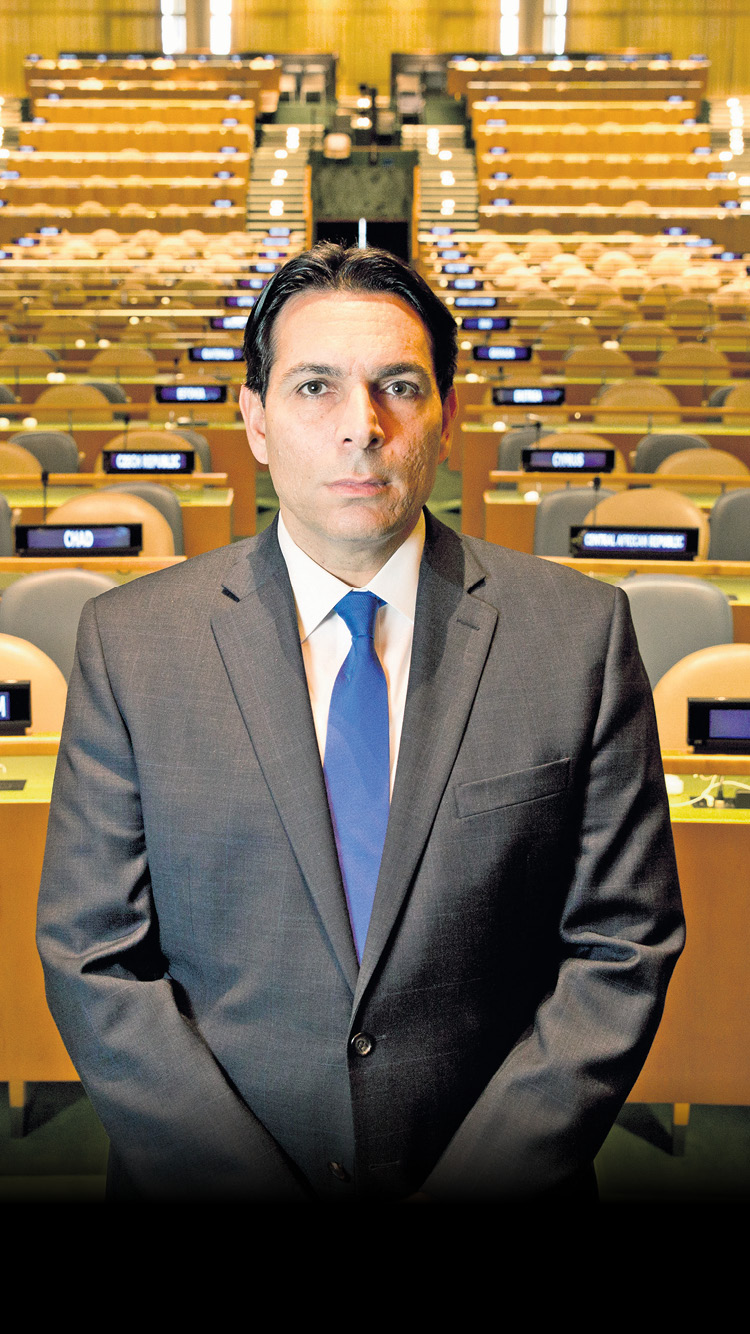
Danon is in New York with this wife Tali and their three children – Aviad, 15, Hila, 11, and Shira, 9. He is satisfied with their adjustment, although it won’t be difficult for him to convince them to return home at the end of his term.
“When I arrived here, I was promised that the children would speak English by Passover. So it took them slightly longer, but now we have begun the second year and it’s much easier for them. They were in Israel for the summer with my wife, and if she hadn’t been with them there they would have refused to board the return flight. They have adjusted to life here, but their home is in Israel.”
Do you actually get to enjoy New York?
“I enjoyed it much more when I came here on visits. At the end of the day, it’s the usual daily life. You send the kids to school and go to work. We came from a moshav in Israel and we miss the greenery, so on weekends we go to Central Park. All in all, it’s simple things. As far as I’m concerned, the city ends at Turtle Bay. Everything that happens beyond 42nd Street seems like overseas.”
Have you had a particularly bad day here?
“There are days when you sit at a Security Council session for eight hours, and state after state rip us apart. I hold my tongue hard, go home and tell my wife not to ask me how was work today.”










